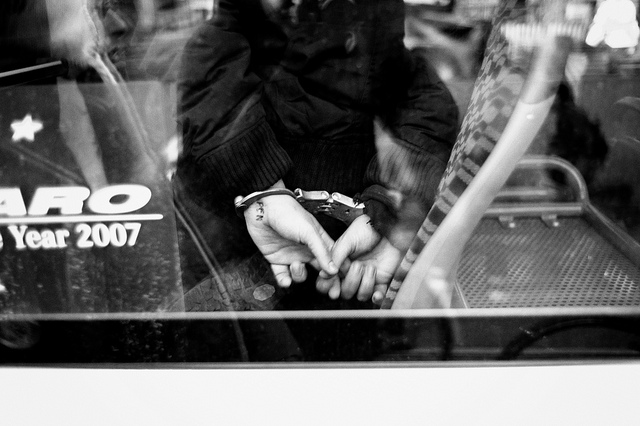In light of recent events, mass protests have sparked up across the nation still reeling from the COVID-19 Pandemic. The death of George Floyd has prompted numerous civil rights movements in Minneapolis, Washington D.C. and even Indianapolis. Whether you’ve decided to partake in the protests or watch it unfold on television, it is no doubt a tumultuous time. Since the protests have escalated to violent occurrences, criminal charges frequently pop up as police attempt to maintain order. Many individuals who have taken to the streets to voice their outrage now face the possibility of having criminal charges levied against them. This article will categorize common criminal charges that are filed against protestors and the rights you have when arrested.
1. Burglary
A person who breaks and enters the building or structure belonging to another person with the intent to commit a felony or theft is guilty of Burglary. Breaking and entering involves using a subtle or forceful means to enter a place you do not have permission to enter. Burglary is a Level 5 felony on its face, but it can be bumped up to Level 4 or even Level 1 depending on aggravating facts. Burglary charges frequently pop if a storefront is looted and police can identify the person who broke in. As a Level 5 felony, Burglary carries the penalty of 1 to 6 years in prison and a maximum fine of $10,000.
2. Theft
A person commits theft when he or she knowingly or intentionally exerts unauthorized control over another person’s property, with the intent to deprive the other person of the value or use of the property. In this context, unauthorized control essentially means taking something that belongs to someone else without their consent. Theft is a Class A misdemeanor which carries a maximum fine of $5,000 and imprisonment for up to 1 year.
3. Resisting Law Enforcement
Resisting Law Enforcement is charged when a person knowingly or intentionally forcibly resists, obstructs, or interferes with a law enforcement officer while the officer is lawfully engaged in his duties. Resisting also includes fleeing from a police officer when the officer has instructed you to stop. This offense is a Class A misdemeanor with a penalty of a maximum fine of $5,000 and up to 1 year in jail.
4. Criminal Mischief
Mischief is when a person knowingly, recklessly, or intentionally damages or defaces the property of another without their consent. Mischief is considered a Class B Misdemeanor with 180 days maximum jail time and a fine not exceeding $1,000. Certain aggravating facts may elevate the crime to Class A depending on the monetary value of the property or what kind of property was defaced.
5. Battery
A person commits battery by knowingly or intentionally touching another person in a rude, insolent, or angry manner. Depending on the severity of the offense, battery may be charged as a misdemeanor or felony. Under Indiana law, specific individuals receive special protection in regard to offensive touching. The most relevant here are law enforcement officers who can arrest you for improper touching, even if no injury resulted.
6. Disorderly Conduct
Disorderly Conduct is a Class B misdemeanor and is charged when a person who recklessly, knowingly, or intentionally starts a fight, causes tumultuous conduct, makes loud noises after being told to stop or interferes with a lawful assembly of people. Sometimes this charge is called breaching the peace and covers a broad range of conduct. As a Class B misdemeanor, disorderly conduct carries a penalty of not more than 180 days in jail and a maximum fine of $1,000. The critical question in these cases is if there is sufficient evidence of tumultuous conduct, noise, or disruption in the record.
7. Criminal Recklessness
Similarly, to how Battery can be bumped up to a felony depending on the circumstances, Criminal Recklessness functions the same way. At its core, recklessness is defined as a person who recklessly, knowingly, intentionally performs an act that creates a substantial risk of bodily injury to another person. When prosecuting a charge of recklessness, the state must show that he or she realized or should have realized that there was a strong probability that such harm might result. In the case of protests, this might come down to throwing something in a crowd.
8. Intimidation
Last but not least, intimidation is a Class A misdemeanor that occurs when a person communicates a threat with the intent to force another person to act against their will, put another person in fear of retaliation or cause another person to be removed from their home or building. This charge can also be bumped up to a level 6 felony if the threat is to commit a forcible felony and the person is a law enforcement officer to whom the threat is communicated. A conviction of a level 6 felony can result in prison time for 6 months to 1.5 years and a $10,000 fine.
If you are facing criminal charges, it is crucial to have an experienced attorney that has litigated hundreds of cases from both the perspective of both the state and defense. Contact the former prosecutors at Banks & Brower at (317) 870-0019, or emailing info@banksbrower.com anytime for a free consultation with our experienced Indianapolis criminal defense lawyers.

